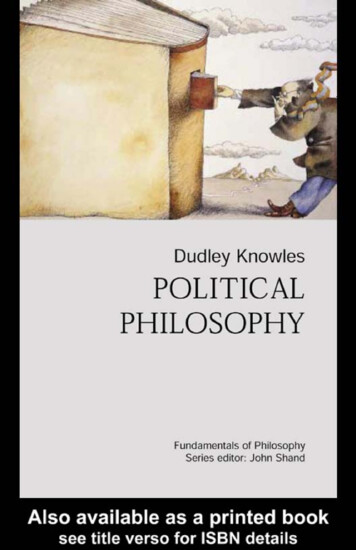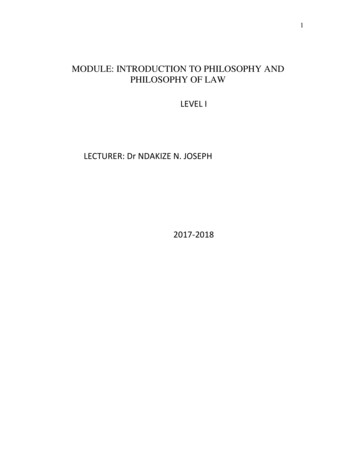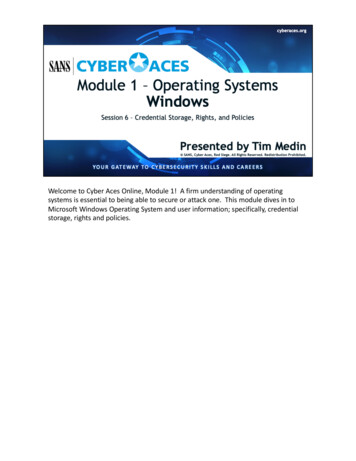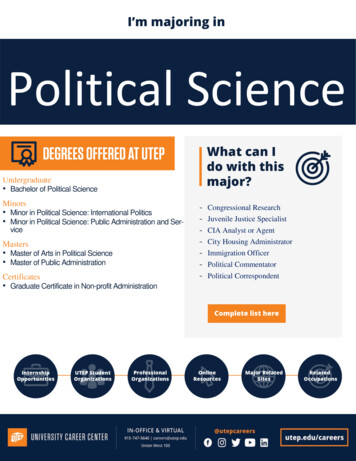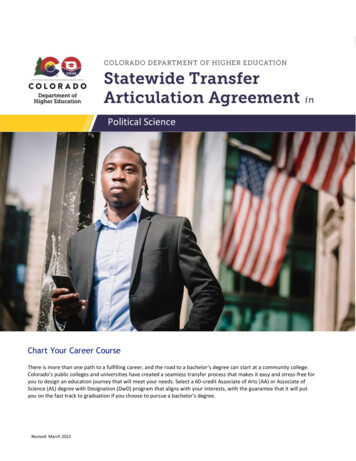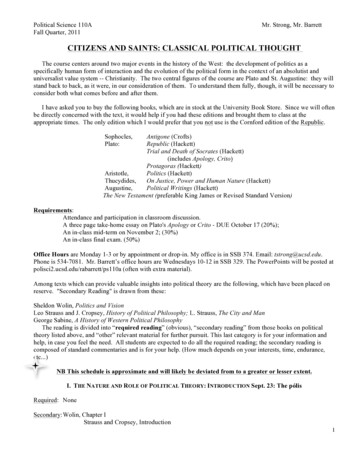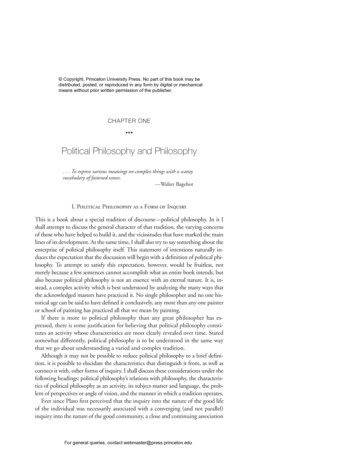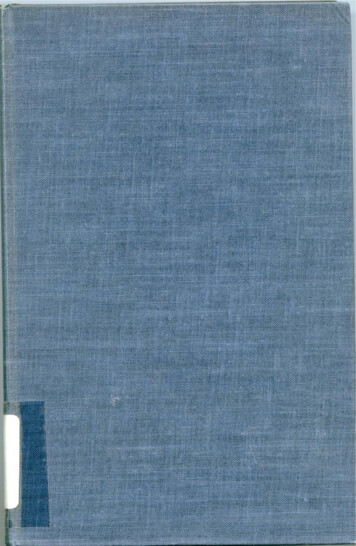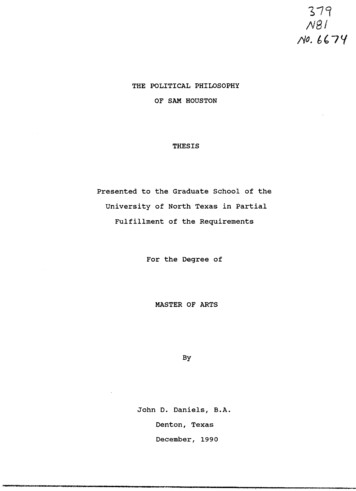
Transcription
/Vr/THE POLITICAL PHILOSOPHYOF SAM HOUSTONTHESISPresented to the Graduate School of theUniversity of North Texas in PartialFulfillment of the RequirementsFor the Degree ofMASTER OF ARTSByJohn D.Daniels,Denton,B.A.TexasDecember, 1990
Daniels, John D., The Political Philosophy of SamHouston.Master of Arts(History), December 1990,299 pp.,bibliography, 193 titles.Although most Americans view Sam Houston as a militaryleader and practical politician with little understanding ofintellectual issues, he actually possessed a complex moraland political philosophy which he elaborated anddemonstrated during a fifty-year public career.He basedhis philosophy on a mixture of Christian idealism andpragmatic realism, with duty, honor, and strict moralityserving to restrain his love of reality,physical pleasures.reason,andThe dual nature of his moral beliefsextended into his politics, which mixed Jeffersonianrepublicanism, individual rights,and limited government,with Jacksonian democracy, the needs of society,will of the people.and theThroughout most of his career he keptthose conflicting sets of ideals successfully in balance,with only the turmoil of the 1850s leading him into extremepositions.
Copyright byJohn D. Daniels1990iii
ACKNOWLEDGMENTI wish to express my gratitude to Jim B. Pearson, whocontributed much to the development of this work before hisuntimely death.iv
TABLE OF CONTENTSPageINTRODUCTION2.PERSONAL LIFE AND PUBLIC CAREER.3.PERSONAL PHILOSOPHY AND BASIC BELIEFS.04.INDIVIDUAL RIGHTS AND DEMOCRATIC GOVERNMENT5.MANIFEST DESTINY AND INDIAN POLICY6.LAND POLICY AND BOUNDARY DISPUTES .7.10.a. *.*.193464.97.130CONSTITUTIONAL GOVERNMENT ANDEXECUTIVE POWERS .a.157FOREIGN DIPLOMACY AND INTERNATIONALINTERVENTION .192ECONOMIC POLICY AND GOVERNMENT FINANCE.214.257.285CONCLUSION.a .BIBLIOGRAPHY.V.9.8. .1.Chapter
CHAPTER 1INTRODUCTIONAn extensive body of literature already exists on thesubject of Sam Houston.Biographers have produced manydifferent treatments of his life, with their contentsranging from uncritical praises of Houston's virtues andpopular tales of his life and times,of his actions and motives.to scholarly analysesHistorians have investigatedmany aspects of his life in minute detail. 2With such animpressive quantity of work already in print,the creationof yet another volume requires some explanation.Basically,the current body of work neglects two important aspects ofSam Houston.The first neglected aspect lies in the area of overallinterpretation.Books and articles have covered parts ofHouston's career over and over again.For example,scholarly journals and popular magazines have published manyarticles about the battle of San Jacinto.3Numerousarticles have also covered various other military campaignsthat involved Houston, such as the Snively Expedition andthe Mier Expedition. 4No author, however,has attempted totie all those military campaigns together in a generaldiscussion of Houston's military policies and militarystrategies.Similarly, a vast number of books and articles1
have dealt with various topics concerning Houston's policiestowards the Indians,but few authors have tried to unite allthose topics into a general discussion of Houston and Indianpolicy. 5Nonetheless, though such topical overviews are few innumber and limited in scope, they do exist.What iscompletely missing is an overview of all of Houston's publicpolicies.No one has tried to analyze those policies andthen to integrate them into a statement of his politicalphilosophy.This volume will attempt to provide thatmissing overall interpretation.summary of Houston's life,After presenting a briefit offers topical overviews ofall the major subjects that Houston addressed during hispublic career.The concluding chapter then attempts tointegrate the topical overviews into one overall summary ofHouston's political philosophy.Critical scholars could offer three major objections,or questions, to such a procedure.sufficient,valid?First,is thereappropriate evidence to make such a procedureHouston's public career lasted from 1813 to 1861.During those forty-eight years he was usually in someposition of public trust,commands,at various times holding militaryexecutive positions,and legislative posts.the process he left behind an extensive public record,including eight volumes of private letters,documents, and public speeches.62publicSince he held bothIn
executive and legislative positions,check on his speeches.Simply put,his actions serve as athis extensive body ofdeeds and words, not speculation about Houston's unstatedmotives or psychology, provides the material for this study.Second, did Houston have a set of ideas which headhered to consistently enough to be considered a politicalphilosophy?Some military and political leaders arepragmatic men of action who adapt their principles to fittheir situation.Such leaders cannot be considered to havea true political philosophy.Houston was not such a man!He rarely changed his views to suit his circumstances, andhe was remarkably consistent in his public positions.Infact, he frequently made stands which cost him politicalpopularity.Although he did occasionally contradicthimself on a given subject,these inconsistencies usuallyoccurred under extreme circumstances.Third, did Houston simply acquire his principles as abody from someone else, or were his ideas different enoughto be worth considering independently?definitely a Jacksonian.Houston wasHe shared many ideas with hisfriend and mentor, Andrew Jackson, but he also had somedefinite differences with him.In addition, Houston spentmuch of his public life outside the direct influence ofJackson.From 1832 to 1845 Houston lived in Texas,of the United States, and in 1845 Jackson died.outsideIf Houstonwas a Jacksonian in his later years, he was one simply3
because he understood the philosophy well enough to apply itto his own circumstances.In short, his differences inphilosophy and his differences in application aresignificant enough to make Houston worth separateconsideration.The second neglected aspect of Sam Houston lies in thearea of his significance.Texas historians recognizeHouston's importance in the development of Texas,butAmerican historians largely discount his significance in thedevelopment of the United States.General histories of theUnited States usually mention his part in the Battle of SanJacinto, and they occasionally mention his election as thefirst President of the Texas Republic, but they virtuallyignore the rest of his career.8Most topical histories ofthe American antebellum period also give Houston littleattention.For example, books on pre-Civil War Indianpolicy rarely even mention him.9Books on the developmentof the secession movement do include him, but only as aminor figure of the period, while books on the Jacksonianmovement either ignore him altogether or make only minorreferences to him.10In one sense the American historians are correct.Theyare looking for men who had a positive effect on the outcomeof historical events.impact on U.S.events.After 1845 Houston had only a minorOn the level of politicalprinciples, though, he has a much greater significance.4He
was virtually the only Jacksonian who managed to retain animportant political position until the beginning of theCivil War.His career during the 1850s provides anexcellent illustration of how an old style democrat reactedto the rise of the new political doctrines which swept thecountry toward sectional conflict.This volume attempts toshow how the battle between Houston and his opponents on awide range of issues provided a stunning demonstration ofthe problems and consequences of antebellum politicalphilosophies.5
Notes1Popular works include George Creel, Sam Houston:Colossus in Buckskin (New York: Cosmopolitan BookCorporation, 1928); Charles Edward Lester, Life andAchievements of Sam Houston: Hero and Statesman (New York:John B. Alden, 1887).Scholarly analyses include MarquisJames, The Raven: A Biography of Sam Houston, introductionby Henry Steele Commager (Indianapolis, Ind.: Bobbs-MerrillCompany, 1929; reprint, New York: Grosset & Dunlap, [1953]);Llerena B. Friend, Sam Houston: The Great Designer (Austin:University of Texas Press, 1954; reprint, 1969).2A good example is Jack Gregory and Rennard Strickland,Sam Houston with the Cherokees, 1829-1833 (Austin:University of Texas Press, 1967).3Michael Fluent, "San Jacinto," American HistoryIllustrated 21 (May 1986): 22-31; Jenkins Garrett, "A 1971Look at San Jacinto," Stirpes 11 (June 1971): 43-7; AllenLee Hamilton, "Pathway to Retreat Ignored," Military History5 (October 1988): 18-25; Richard Jackson, "Costliest Nap inMilitary History," True West 6 (May/June 1959): 12-4, 34.4 HarryA. Gailey, Jr., "Sam Houston and the Texas WarFever, March - August, 1842," Southwestern HistoricalQuarterly 57 (July 1958): 29-44; Ralph A. Wooster, "TexasMilitary Operations Against Mexico, 1842-1843," SouthwesternHistorical Quarterly 67 (April 1964): 465-84.5 Booksand articles on Houston's Indian policiesinclude Mary Whatley Clarke, Chief Bowles and the TexasCherokees (Norman: University of Oklahoma Press, 1971);Prairie View Malone, Sam Houston's Indians: The AlabamaCoushatti (San Antonio, Tex.: Naylor Company, 1960); RobertL. Jones and Pauline H. Jones, "Houston's Politics and theCherokees, 1829-1833," Chronicles of Oklahoma 46 (Winter1968-69): 418-32; Anna Muckleroy, "The Indian Policy of theRepublic of Texas," Southwestern Historical Quarterly 25(April 1922): 229-60; 26 (July 1922): 1-29; 26 (October1922): 128-48; 26 (January 1923): 184-206; John H. Reagan,"The Expulsion of the Cherokees from East Texas," Quarterlyof the Texas State Historical Association 1 (July 1897): 3846; Marilyn McAdams Sibley, "The Texas-Cherokee War of1839," East Texas Historical Journal 3 (March 1965): 18-33;Michael L. Tate, "Military Relations Between the Republic ofTexas and the Comanche Indians," Journal of the West 13(January 1974); 67-77; Alfred M. Williams, "GeneralHouston's Indian Life," Magazine of American History 10(November 1883): 401-8; Dorman H. Winfrey, "Chief Bowles ofthe Texas Cherokee," Chronicles of Oklahoma 32 (Spring1954): 29-41; Ernest William Winkler, "The Cherokee Indians6
in Texas," Quarterly of the Texas State HistoricalAssociation 7 (October 1903): 95-165.Although it onlydeals with the Republic of Texas years, the closest to agood overview is Muckleroy, "Indian Policy."6 AmeliaW. Williams and Eugene C. Barker, eds., TheWritings of Sam Houston, 1813-1863, 8 vols. (Austin:University of Texas Press, 1938-43).7 Hisfight against secession is an excellent example.See Albert Castel, "Sam Houston's Last Fight," AmericanHeritage 17 (December 1965): 80-7.8 JosephR. Conlin, The American Past: a Survey ofAmerican History, 3rd ed. (San Diego: Harcourt BraceJovanovich, 1990), 346-7; Richard N. Current and others,American History: a Survey, 7th ed. (New York: Alfred A.Knopf, 1987),, 366; John M. Blum and others, The NationalExperience: a History of the United States, 7th ed. (SanDiego: Harcourt Brace Jovanovich, 1989), 255; John A.Garraty and Robert A. McCaughey, The American Nation: aHistory of the United States (New York: Harper & Row, 1987),350.9 FrancisPaul Prucha, American Indian Policy in theFormative Years: The Indian Trade and Intercourse Acts,1790-1834 (Cambridge, Mass.: Harvard University Press,1962); Francis Paul Prucha, Indian Policy in the UnitedStates: Historical Essays (Lincoln: University of NebraskaPress, 1981),, Michael Paul Rogin, Fathers and Children:Andrew Jackson and the Subjugation of the American Indian(New York: Alfred A. Knopf, 1975); Robert A. Trennert, Jr.,Alternative to Extinction: Federal Indian Policy and theBeginnings of the Reservation System, 1846-51 (Philadelphia:Temple University Press, 1975).1 0 Bookson the secession movement include Allan Nevins,Ordeal of the Union, 2 vols. (New York: Charles Scribner'sSons, 1947); Richard H. Sewell, A House Divided:Sectionalism and Civil War, 1848-1865 (Baltimore: JohnsHopkins University Press, 1988); Elbert B. Smith, The Deathof Slavery: The United States, 1837-65, Chicago History ofAmerican Civilization Series (Chicago: University of ChicagoPress, 1967).Books on the Jacksonian movement that do notmention Houston at all include Marvin Meyers, The JacksonianPersuasion: Politics and Belief (Stanford, Calif.: StanfordUniversity Press, 1957); Robert V. Remini, The Legacy ofAndrew Jackson: Essays on Democracy, Indian Removal, andSlavery (Baton Rouge: Louisiana State University Press,1988).Books on the Jacksonian movement that contain onlyminor references to Houston include Arthur M. Schlesinger,Jr., The Age of Jackson (Boston: Little, Brown and Company,7
1953),474,489.11With Andrew Jackson,Martin Van Buren, Thomas HartBenton, and others, either retired or dead by 1861, AndrewJohnson was probably the only other major political figurewho remained both active and loyal to Jacksonian ideals.For a similar view, see Donald Day and Harry Herbert Ullom,eds, The Autobiography of Sam Houston (Norman: University ofOklahoma Press, 1954), 266.8
CHAPTER 2PERSONAL LIFE AND PUBLIC CAREERSam Houston's life divides quite naturally into sixphases.Since each phase differed fundamentally from theone that preceded it, his life did not display a naturalprogression, with each stage an outgrowth of the one beforeit.Brief periods of failure alternated with long periodsof success.Although the trends of American history playeda large part in his story,to a great degree he chose hisown course, with his own values and choices usuallyproducing the abrupt swings in his life.Only in the finalyears of his life did the course of events defeat him, buteven then he lasted far longer than seemed possible at thetime.The first phase of Houston's life was,childhood.obviously,He was born in Virginia on March 2,his1793, thefifth of the nine children of Samuel and Elizabeth PaxtonHouston.His father served with distinction in theRevolutionary War and continued as an officer of theVirginia militia after the war,daughter of a rich planter.2while his mother was theThe family estate began as alarge and prosperous one, but business affairs graduallywent bad for the elder Houston,and he resolved to selleverything and begin again on the Tennessee frontier.9
Before he could put that plan into effect, he died inSeptember of 1806.3In the spring of 1807 Houston's mother and all ninechildren moved by wagon to a farm near Maryville, Tennessee.This farm was indeed on the frontier, as it was only a fewmiles from the lands of the Cherokee Indians.4Houston, whowas fourteen at the time, helped to establish the familyfarm, but he showed little talent for agriculture.5Hismother and brothers then persuaded him to work for a time asa clerk in a store in town, but he soon ran away to livewith a tribe of the nearby Cherokees. 6One of the Cherokeechiefs adopted Sam as his son, and over the next few yearshe lived with the Indians,only visiting his white familyand the nearby town occasionally.7When his family asked his reason for this behavior,Houston replied that he enjoyed life in the woods far morethan working on a farm, clerking in a store, or going toschool.8During that time he learned much about the Indianlife and the Indian mind, even learning the Cherokeelanguage well.Most of all, he developed a lifelong respectfor the Indians.9In 1812, at the age of nineteen, Houston returned tothe white world to pay off a monetary debt which he hadincurred.Though he had only about a year of formalschooling himself, he opened a school near Maryville.FromMay until November he taught local children, and the school10
was successful enough to allow him to pay his debt.1 0In March,1813, Houston put an end to his childhoodyears by volunteering to serve in the War of 1812. 11Thoughhe entered as a private, he soon rose to the rank ofsergeant, and then to ensign.12In March, 1814, he wasunder the command of Andrew Jackson as the general moved hisforces against the Creek Indians, who had allied themselveswith the British.At the Battle of Horseshoe Bend,Jackson's army soundly defeated the Creeks, and Houstondisplayed both courage and recklessness at the climacticmoment.13As a result, he suffered serious wounds:anarrow in the thigh, a musket ball in the right arm, and amusket ball in the right shoulder.14Although Houstonalmost died from these wounds and suffered through a longand painful recovery, his actions favorably impressedJackson,and the general became Houston's lifelong friendand benefactor. 15After the war Houston remained in the army,and, withJackson's influence aiding him, he rose to the rank ofsecond lieutenant in 1814,1817.16followed by first lieutenant inAfter postings in New Orleans and Nashville,theU.S. government appointed Houston as an Indian subagent.The Indian Bureau assigned him the task of dealing with hisfriends:the Cherokees.Some of the Cherokee chiefs hadsigned a treaty in which they promised to give up theirlands in Tennessee and move West.11The rest of the chiefs
and most of the tribesmen had not agreed, and they did notwant to move.Houston attempted to convince them to goahead with the move, and by 1818 he persuaded most of thetribe that following the treaty would best serve theirinterests.1 8In early 1818,to Washington.Houston accompanied an Indian delegationIn order to assure the Indians that theycould trust him, he wore Indian attire while performing thisfunction.The Secretary of War, John Calhoun, rebuked himfor failing to wear a proper military uniform. 9Inaddition, the Secretary accused him of abusing his officialposition by aiding slave smugglers.20Houston proved thathe had actually tried to break up the smuggling ring,and hefurther demonstrated that his acccusers were actually inleague with that ring.Nevertheless,Calhoun did notapologize in any way for the false acccusations.21As aresult, Houston became so disgusted that he resigned bothhis commission in the army and his position as subagent.2 2With the United States-army period of his life at aclose,Houston found himself without prospects.He returnedto Tennessee, where he sold his remaining assets to pay somedebts.23He then decided to become a lawyer, so he studiedlaw in a Nashville law office, completing an eighteen-monthcourse of reading in six months.24After attainingadmission to the bar, he opened a law practice in Lebanon,not far from Nashville.25Soon Jackson12arranged for him to
receive an appointment as adjutant-general of the statemilitia.26When Houston's Cherokee friends asked for hishelp in adjusting to problems in their new home, Jacksonalso helped him to secure the appointment as their Indianagent.After weighing his prospects as a lawyer againstthose as an Indian agent, he declined the position.2 7During the next ten years Houston's career flourished.He was elected attorney general of Nashville in October,1819, then resigned that position in 1820 to devote himselfto his private practice in Nashville.28In 1821 theofficers of the Tennessee militia elected him a majorgeneral.29In 1823, with Jackson's assistance,he waselected a member of the U.S. House of Representatives.30Heserved two terms in Washington, where he spent most of histime working for the interests of his constituents andpromoting Jackson for president. 31Tennessee to run for governor,In 1827 he returned tocampaigning on a platformthat favored extensive state internal improvements, and the#32voters favored him by a wide margin.His term as governorwas reasonably successful and essentially uneventful.3 3In early 1829 he prepared to run for reelection.Although his opponent was a tough one, Houston was popular,and his chances looked good.34however,Allen,intervened.His private affairs,In January,1829, he married Elizaa much younger woman who was the daughter of awealthy and influential man. 3513For some unknown reason the
couple separated a few months later, and his wife returnedto her parents.36The resulting scandal forced Houston toresign as governor.Despite his resignation, the furorcontinued to grow, and his friends could not help him.In afit of despair he fled the state, thus bringing to an endthe Tennessee-politics phase of his life.3 7The next period in Houston's life was his Cherokeeinterlude.When he left Tennessee, he went to the onlyplace where he knew that people would welcome him:Cherokee Nation in the Indian territoriesThe Cherokees did indeed welcome him,arms.38the(now Oklahoma).literally with openThe Cherokees were still having great difficultiesin their new home, and Houston began helping them in theirattempts to deal with the U.S. government.39He worked toremove agents who were defrauding the Indians, tried tomaintain peace between the Cherokees and the other tribes inthe area,made trips to Washington with Indian delegations,and even helped neighboring tribes with their governmentproblems.4 0Since Jackson was president and at times helped hisfriend to get results at the Indian Bureau, Houston'sefforts did bring some improvements for the Indians.4As areward for his services, the Cherokees made him a citizen oftheir nation. 42He married an Indian woman,Tiana Rogers,opened an Indian trading post, and speculated in Indianlands. 4 3Houston, however, was not entirely happy.14
Although he had always been a hard drinker,much of the time.he was now drunkThe Indians even nicknamed him "BigDrunk," and he lost so much status with the tribe that hefailed in an attempt to be elected to the tribal council. 4 4His problem seemed to be his shattered career.on his way to the top,white world.He had beenand now he was an exile from theHouston clearly wanted back into the nationalpolitical arena. 45Curiously enough, his Indian rights activitiesindirectly provided the necessary access to the limelight.He became involved in a squabble over providing food rationsto the Indians, with Houston claiming that he wanted toprovide better food for the Indians at lower cost to thegovernment,and his enemies maintaining that Houston wastrying to use political pull to make money at publicexpense.46In 1832 a Congressman named William Stanberymade a speech in the House of Representatives in which heaccused Houston of fraud.4 7with an Indian delegation,Stanbery,While Houston was in Washingtonhe sent a challenging note tobut the Congressman refused to receive it.WhenHouston subsequently met Stanbery in the streets of thecity, he whipped him with a cane.This action led theHouse to try Houston for contempt of Congress, and Houstondefended himself well.Although Congress found him guilty,his closing speech was so effective that it resurrected hisreputation and brought his Cherokee interlude to a close.4 915
While the Stanbery controversy was still brewing,Houston considered his next step.Tennessee was still too hostile,Texas. 5 0The political climate inso he decided to tryHe left his Indian life and Indian wife andarrived in the area in December of 1832.51Though he wasnominally on a mission for Andrew Jackson to the ComancheIndians, he quickly became a Texas resident.52next few years,Over thehe engaged in land speculation, establisheda law practice, and became involved in local politics, whilestill maintaining his contacts with his Washington friendsand with his Indian friends.53As Texas moved towards abreak with Mexico, he gradually became one of the leaders ofthat revolution. 5 4From 1833 to 1836, Texas voters elected three differentconventions to deal with the Mexican problems, with eachmeetingmore radical than the previous one.The 1833Convention petitioned for separate statehood, the 1835Consultation created a provisional government,Convention declared independence.55and the 1836Houston was a prominentmember of all three conventions, with both the 1835 and the1836 meetings electing him major-general of the TexasArmy.56Houston, however,favored a defensive war againstMexico, while most of the government and much of the armyfavored an offensive war.5 7As a result, the army largelyignored him, and his only important contribution beforeMarch,1836, was to negotiate a peace treaty with the Texas16
Cherokees.'The provisional goverment briefly cleared Texas ofMexican troops, but the leaders squabbled among themselvesand failed to maintain a disciplined force. 5 9In February,1836, Santa Anna invaded Texas with a large army which intwo months annihilated the opposition at San Antonio and atGoliad.6 0In March Houston finally gained command of theonly remaining large Texas force.61Stalling for time, hebegan a gradual retreat, meanwhile training his men,gathering additional forces, and waiting for Santa Anna togive him an opening.62Though both the government and hisown men insisted that Houston stand and fight, he continuedthe retreat for over a month.6 3Eventually,on April 21,Houston moved his forces into position, and1836, the Texas Army gained a stunning victoryat the Battle of San Jacinto.64During the battle, hereceived a serious leg wound just above the ankle and leftthe army to go to New Orleans for treatment.65Although thevictory effectively secured Texas independence,in Houston'sabsence the army challenged the authority of the civiliangovernment, and the situation threatened to get out ofcontrol.66After two months, Houston returned to Texas, andin late 1836, he was elected the first President of the newTexas Republic.67To reestablish control over the army, hesimply furloughed most of the troops. 6 8During the next two years Houston organized a17
functioning national government based on his objectives ofpeace and prosperity.He refused to consider offensivemeasures against Mexico, and he tried to build a peacefulrelationship with the Indian tribes.69Although the U.S.government recognized Texas as an independent government,itrefused to consider the annexation which Texas votersoverwhelmingly requested.70With the United States in thegrip of the Panic of 1837, Texas suffered from economic hardtimes,but Houston worked to keep the expenditures ofgovernment down,tried to keep the value of Texas papermoney from decreasing,counts.and achieved some success on bothWhen he left office in December,1838,Texas wasin a relatively peaceful and moderately stable condition.7 2Mirabeau B.Lamar followed Houston as president,proceeded to change virtually every policy.the size of all parts of the government,increased government expenditures,and heHe increaseddrasticallyand created vast amountsof paper money to pay for these measures.7 3As a result,the value of the paper money fell to a small fraction of itsface value, and the government was unable to pay itsbills. 7In addition,Lamar made war on the Indians, and hesent naval and military expeditions against the Mexicans.7 5These military efforts brought disaster in Mexico andwidespread Indian depredations on the frontier.76As amember of the Texas House from 1839 to 1841, Houston opposedthese changes but could not stop them.7 718While public
matters went against him, Houston's personal affairsimproved.He married a young Alabama woman, Margaret Lea,and she brought him happiness, while curbing some of his badhabits.7 8In 1841 the voters overwhelmingly returned Houston tothe Presidency,and over the next three years he tried torestore order to the government by slashing governmentexpenditures to the bone and attempting to stabilize thevalue of the currency.79He made peace with the Indians andtried to end the war with Mexico, but Mexican raids acrossthe border led to a public outcry for retaliation.80Aftersome resistance to offensive measures, Houston responded tothe demands by reluctantly authorizing three expeditions,ofwhich two were merely unsuccessful, while the other wasdisastrous.81During this second term he also tried torevive interest in the U.S.for Texas annexation,althoughhe personally had an ambivalent attitude on the subject.8 2When Houston left office in December,1844, Anson Jonessucceeded him, and Jones supervised the process by whichTexas became a state of the Union in December,1845.83The annexation ended the Texas-politics phase ofHouston's life, because the new Texas state legislatureelected him as one of its U.S.Senators.84He took his seatin March of 1846 and remained a Senator until 1859.85Although he was still deeply involved in Texas affairs, hisinterests quickly broadened to the national political19
scene.86In April, 1846, friction over Texas annexationescalated into war between the U.S.and Mexico,and Houstonvigorously supported the President's war programs, whilepushing for large acquisitions of Mexican territory andarguing for a protectorate over the rest of Mexico.Hewas very displeased when the peace treaty gave the U.S. onlyNew Mexico and California.88The war, however,bigger question.involved the U.S.Congress,in a muchSince the country had also settled theOregon boundary question in 1846, the legislative branch hadvast new territories to organize.89Bitter disputes overallowing slavery in those areas dominated politics from thelate 1840s until the outbreak of the Civil War, withsouthern extremists demanding slavery in all territories andnorthern extremists insisting on slavery in none of them. 9 0Houston was caught in the middle.He wanted slavery whereit was economically feasible, namely Southern territories,but he saw no harm in prohibiting it elsewhere.9As thebattle over slavery escalated, Southern politicians directedmuch of their anger against Houston, whom they regarded as atraitor to the Southern cause.9 2Houston was the only Southern Senator who consistentlyvoted a moderate position on the slavery question.In 1848he was one of only two Southerners who voted for prohibitingslavery in .Oregon. 93He was the only Southerner who votedfor all parts of the Compromise of 1850,20which included
a
Writings of Sam Houston, 1813-1863, 8 vols. (Austin: University of Texas Press, 1938-43). 7His fight against secession is an excellent example. See Albert Castel, "Sam Houston's Last Fight," American Heritage 17 (December 1965): 80-7. 8Joseph R. Conlin, The American Past: a Survey of American History, 3rd ed. (San Diego: Harcourt Brace


